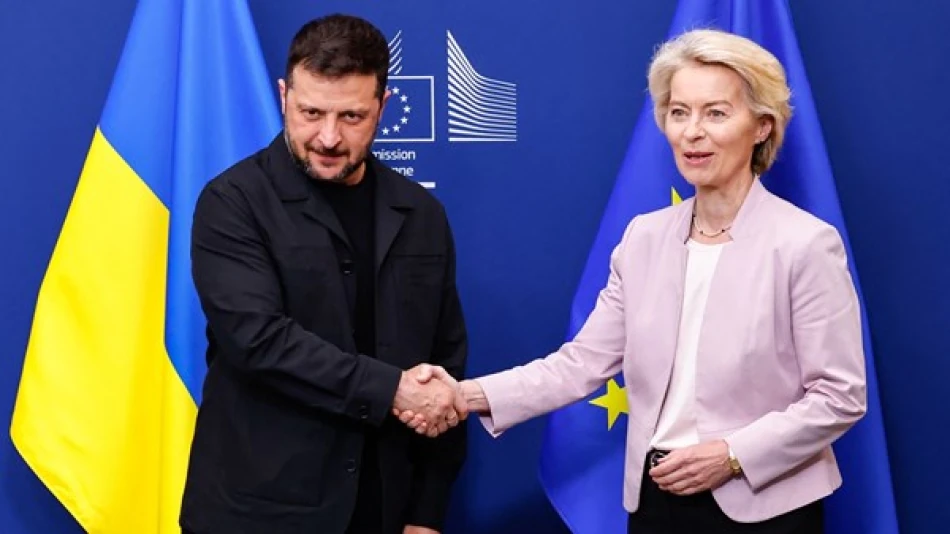
European Leaders Prepare for Highly Anticipated Trump-Zelensky Meeting Tomorrow
European Leaders Rush to Washington as Trump-Zelensky Peace Talks Take Center Stage
A high-stakes diplomatic convergence is unfolding in Washington as major European leaders prepare to join Ukrainian President Volodymyr Zelensky for his crucial meeting with President Donald Trump on Monday. The unprecedented show of European unity signals growing concern that Ukraine's fate—and Europe's security architecture—may be decided without adequate European input in the emerging Trump-Putin peace framework.
Unprecedented European Mobilization
European Commission President Ursula von der Leyen announced on X that she would join the White House meeting "at President Zelensky's request," alongside other European leaders. The delegation includes British Prime Minister Keir Starmer, French President Emmanuel Macron, German Chancellor Friedrich Merz, Finnish President Alexander Stubb, and NATO Secretary-General Mark Rutte. Italian Prime Minister Giorgia Meloni has also confirmed her participation.
This rapid mobilization represents one of the largest European leadership gatherings in Washington in recent memory, underscoring the gravity of the moment for transatlantic relations.
Strategic Coordination Ahead of Critical Talks
Before departing for Washington, European leaders are conducting intensive preparatory discussions. Zelensky is scheduled to participate in a virtual meeting in Brussels on Sunday afternoon with the "Coalition of the Willing"—a group comprising major European nations, the EU, NATO, and non-European allies including Canada.
According to diplomatic sources, the Brussels session will focus on two critical elements: security guarantees for Ukraine under any potential peace agreement, and the broader framework that could govern a Russia-Ukraine settlement.
Trump's New Peace Strategy
Following his Friday meeting with Vladimir Putin, Trump indicated a shift in approach, focusing on crafting a comprehensive peace agreement rather than pursuing an interim ceasefire. This departure from traditional conflict resolution models suggests Trump aims for a definitive settlement that could reshape European security arrangements.
Europe's Strategic Dilemma
The massive European presence in Washington reflects deeper anxieties about being sidelined in negotiations that will fundamentally affect European security. Unlike previous US-Russia diplomatic engagements during the Cold War, when European input was often secondary, today's EU represents the world's largest economic bloc with substantial security interests at stake.
France's Élysée Palace framed Macron's participation as essential for "continuing coordinated work between Europeans and the United States to achieve a just and lasting peace that safeguards Ukraine's vital interests and Europe's security." This language suggests European leaders view their presence not as supportive, but as necessary to protect their own strategic interests.
Market and Geopolitical Implications
The diplomatic intensity surrounding these talks is already influencing markets, with European defense stocks showing volatility as investors weigh the implications of various peace scenarios. Energy markets are particularly sensitive, given that any Ukraine settlement will likely address gas transit routes and sanctions regimes affecting Russian energy exports.
For NATO allies, the outcome could determine future defense spending commitments and alliance structures. A peace deal that appears to reward Russian aggression might accelerate European defense integration efforts, potentially creating new market opportunities in the defense sector while reshaping transatlantic trade relationships.
Historical Precedent and Future Implications
The coordinated European response mirrors the diplomatic activism seen during previous major geopolitical shifts, such as German reunification negotiations in 1990. However, the current situation is more complex, involving not just territorial questions but fundamental principles of international law and collective security.
The success or failure of this European diplomatic offensive could set important precedents for how major powers conduct negotiations in an increasingly multipolar world. If European leaders secure meaningful input into the peace process, it could strengthen the EU's role as a global diplomatic actor. Conversely, being marginalized could accelerate European strategic autonomy efforts and potentially strain transatlantic relations for years to come.
Most Viewed News

 Layla Al Mansoori
Layla Al Mansoori






